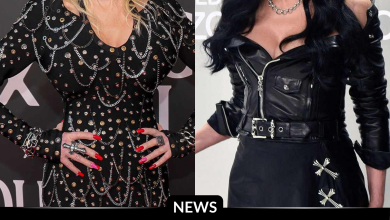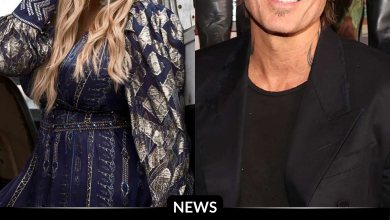Angelina Jolie Rewrites History: The Truth Behind Maria Callas’s Legacy and the Real Meaning of ‘Diva’ – Find Out More!
OPINION: This article may contain commentary which reflects the author's opinion.
In her portrayal of the legendary opera singer Maria Callas in the 2024 biographical film Maria, directed by Pablo Larraín, Angelina Jolie uses the opportunity to reexamine and challenge the often negative connotations of the word “diva.” Through her character study of Callas, especially as the film delves into the final days of the soprano’s life in 1970s Paris, Jolie seeks to shift the narrative surrounding this frequently misunderstood label and highlight the complexities behind public perceptions of women, particularly those in the spotlight.
Maria: A Film on Callas’s Final Years
Maria provides a poignant glimpse into the life of Maria Callas, one of the most iconic and controversial figures in the world of opera. The film focuses on Callas’s final years in Paris, where she grapples with her identity and legacy. As Callas reflects on her personal and professional life, Maria paints a portrait of a woman who, despite her immense talent, was often subject to public scrutiny and criticism. Jolie’s portrayal brings a new depth to Callas, focusing on her struggles, vulnerabilities, and the pressures she faced as a public figure.
The film presents an intimate exploration of Callas’s life, depicting the emotional and personal costs of being in the public eye. It’s a portrayal that goes beyond the surface-level depiction of a glamorous diva and explores the sacrifices and challenges that defined her.
Jolie’s Reexamination of the Term “Diva”
At the Venice Film Festival in August 2024, Jolie spoke openly about her portrayal of Callas and how it led her to reevaluate the term “diva.” Reflecting on her experience, Jolie remarked, “I’ve relearned that word from Maria, I have a new relationship to it. It’s often other people’s perception of a woman that defines too much who she is and who she was. I think Maria was one of the hardest working people who didn’t hurt anybody.”
In this statement, Jolie emphasizes how the term “diva” is frequently shaped by societal perceptions rather than the individual’s true character or actions. The word is often associated with temperamental behavior, demanding personalities, and an air of superiority—traits that have been widely used to describe powerful women in entertainment and beyond. Jolie’s reflection, however, draws attention to the fact that these assumptions are frequently based on external judgment and not the reality of a woman’s actions or intentions.
Challenging the Negative Stereotype
Jolie’s portrayal of Callas in Maria aims to humanize the concept of the “diva,” challenging the cultural stereotype that often surrounds women in positions of power or visibility. In popular culture, especially on platforms like TikTok, the term “diva” is sometimes used derisively to describe women who are seen as difficult or hard to work with, reinforcing negative and limiting stereotypes.
By embracing the complexity of Callas’s character, Jolie seeks to change the conversation about powerful women in the public eye. She presents Callas not as a temperamental figure but as a deeply dedicated artist who worked tirelessly, often sacrificing her personal happiness for her craft. Through Jolie’s performance, the audience is invited to see the term “diva” in a new light, one that appreciates the commitment and hard work behind the persona, rather than reducing it to a caricature of ego and entitlement.
Reception of Maria and Jolie’s Performance
The critical reception of Maria has been mixed, with praise directed at Jolie’s nuanced performance. Reviewers have highlighted her ability to capture the complexity of Callas, portraying her not just as a famous diva but as a multi-dimensional woman facing personal turmoil. However, some critics have pointed out that the film’s narrative lacks the depth needed to fully explore Callas’s life and legacy, which led to a less comprehensive portrayal than some might have hoped.
Despite these critiques, Jolie’s performance remains the highlight of the film. She has been lauded for her empathetic portrayal, offering a new perspective on a woman who has long been subject to scrutiny and judgment. Her performance adds a layer of empathy for women who are often unfairly labeled, allowing audiences to reconsider their preconceived notions about public figures, especially women.
A Broader Conversation About Women and Public Perception
Jolie’s comments and portrayal of Callas contribute to a broader conversation about the challenges women face in the public eye, particularly when it comes to the labels society places on them. The term “diva” is just one example of how women’s behavior is often scrutinized and critiqued more harshly than men’s. By challenging the stereotype of the “difficult diva,” Jolie invites viewers to reconsider how they perceive powerful and successful women, urging society to look beyond surface-level judgments and appreciate the depth and humanity of these individuals.
Conclusion
Angelina Jolie’s role as Maria Callas in Maria goes beyond just a performance—it’s a statement about redefining the way we view women who are often labeled unfairly. Through her portrayal of Callas, Jolie challenges the negative connotations of the word “diva,” offering a more compassionate and nuanced perspective on women in the public eye. In doing so, she encourages a more empathetic approach to understanding the complexities of women’s lives, urging us all to question the stereotypes that limit how we see powerful figures, particularly those in entertainment.



